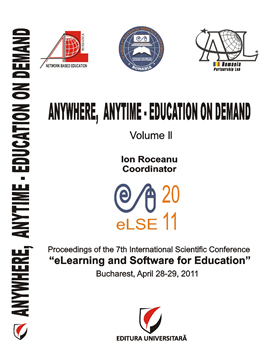TEACHING COMPETENCES IN THE E-LEARNING COMMUNITY
TEACHING COMPETENCES IN THE E-LEARNING COMMUNITY
Author(s): Letitia TrifSubject(s): Education
Published by: Carol I National Defence University Publishing House
Keywords: educational policies; teaching competences; society of knowledge.
Summary/Abstract: Educational policies documents at European level reaffirm the statute of teachers as key actors in any strategy that targets the socio-economic stimulation and development. For instance, as part of the European strategy for development by 2010, the Report of the European Council on the concrete objectives of educational and formation systems mentioned, first on the priority list, the increase in quality and efficiency of educational and formation systems in the European Union and the improvement of initial and continuous formation programmes for teachers. Traditional formation practices no longer offer those who train to become educators all the competences needed in order to prepare students to face the professional activity successfully in a society and economy based on knowledge. Teaching in the Society of Knowledge include: the actual use of the new technologies in the classroom in order to promote the necessary competences for the 21st century; the identification of ways in which students and teachers can use computers and Internet to improve the learning process through research, communication, collaboration and through strategies and instruments specific to productivity; the offering of learning opportunities through practical experiments and creating curricular projects and evaluations which relate to the national standards in the field of education and technology; didactic strategies which encourage the focusing on the student and formation of superior level thinking abilities; collaboration with the colleagues in order to improve the teaching process by solving problems and participating in improving lesson plans. The teacher is responsible for the creation of an adequate learning environment, and for preparing activities which would facilitate the use of technology by the students in order to learn and communicate. In a modern and efficient educational environment, technology offers students the opportunities: to become capable of using the information and communication technologies; to research, analyse and evaluate information; to use instruments specific to productivity creatively and efficiently; to communicate, collaborate, edit and create; to become well-informed, responsible and involved citizens.
Journal: Conference proceedings of »eLearning and Software for Education« (eLSE)
- Issue Year: 7/2011
- Issue No: 02
- Page Range: 544-548
- Page Count: 5
- Language: English

